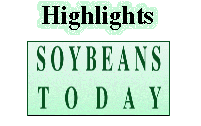


Soybean producers can use computer technology to determine which varieties are best suited to each of their fields, says Dr. Lanny Ashlock, soybean agronomist for the Cooperative Extension Service, University of Arkansas.
"SOYVA, the Extension soybean variety selection program, determines which varieties are most and least likely to do well on a particular field,'' said Ashlock.
"In 1995, the SOWA program selected from 91 possible varieties. The 1996 version of the program will choose from at least that many."
 All a grower has to do is answer 14 questions.
All a grower has to do is answer 14 questions.
"SOWA keeps track of thousands of possible combinations of cultural practices and disease problems that can occur in a field," noted Ashlock. "Using the grower's data, the program selects varieties that avoid potential problems."
SOYVA classifies the 100 or so soybean varieties in the program as either highly recommended, recommended, or not recommended.
The highly recommended and recommended varieties are further categorized by their relative maturity: very early, prior to Oct. 1; early maturity, prior to Oct. 8; medium matu rity, Oct. 8-26; and late maturity, after Oct. 26.
"You should be able to take the SOYVA recommendation and your field's yield history and select one or more varieties from each maturity group," said Ashlock.
The SOYVA recommendation also lists yield results from the University of Arkansas's Variety Performance Tests.
Soybean growers can have the SOYVA program run for free at their county Cooperative Extension Service, or they can buy the program for $15 and run it at home
